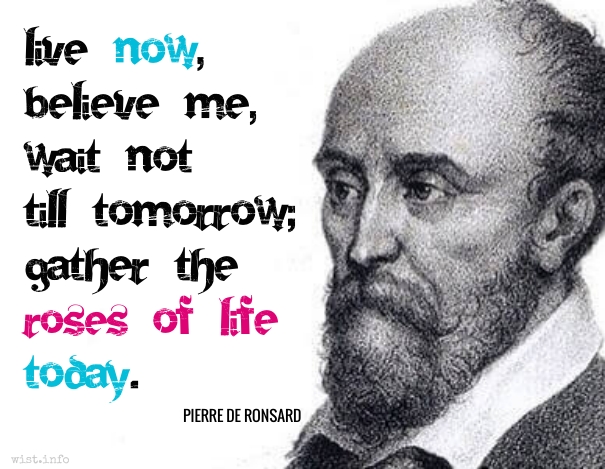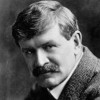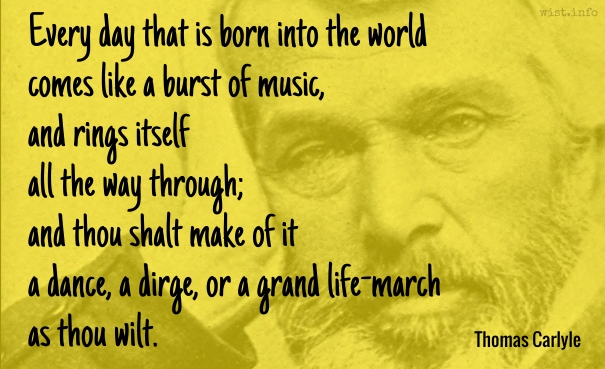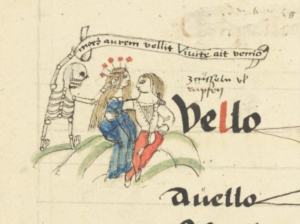Since Joys are so uncertain; take Gladness when it comes.
Thomas Fuller (1654-1734) English physician, preacher, aphorist, writer
Introductio ad Prudentiam, Vol. 1, # 101 (1725)
(Source)
Quotations about:
carpe diem
Note not all quotations have been tagged, so Search may find additional quotes on this topic.
Come, let us live and love, my dear,
A fig for all the pratings drear
Of sour old sages, worldly wise.
Aye, suns may set again to rise;
But as for us, when once our sun
His little course of light has run,
An endless night we’ll sleep away.
[Vivamus, mea Lesbia, atque amemus
rumoresque senum severiorum
omnes unius aestimemus assis
soles occidere et redire possunt:
nobis cum semel occidit brevis lux,
nox est perpetua una dormienda.]Catullus (c. 84 BC – c. 54 BC) Latin poet [Gaius Valerius Catullus]
Carmina # 5 “To Lesbia,” ll. 1-6 [tr. Stewart (1915)]
(Source)
One of Catulllus' most popular and widely-translated poems.
(Source (Latin)). Alternate translations:
Come and let us live, my Deare,
Let us love and never feare
What the sourest Fathers say:
Brightest Sol that dyes to-day
Lives againe as blithe to-morrow;
But if we darke sons of sorrow
Set, ô then, how long a Night
Shuts the Eyes of our short light!
[tr. Crashaw (1648)]
Lesbia, live to love and pleasure,
Careless what the grave may say:
When each moment is a treasure
Why should lovers lose a day?
Setting suns shall rise in glory,
But when little life is o'er,
There's an end of all the story --
We shall sleep, and wake no more.
[tr. Langhorne (c. 1765)]
Let's live, and love, my darling fair!
And not a single farthing care
For age's babbling spite;
Yon suns that set again shall rise,
but, when our transient meteor dies,
We sleep in endless night.
[tr. Nott (1795)]
My Lesbia, let us love and live,
And to the winds, my Lesbia, give
Each cold restraint, each boding fear
Of age and all her saws severe.
Yon sun now posting to the main
Will set -- but 'tis to rise again: --
But we, when once our mortal light
Is set, must sleep in endless night!
[tr. Coleridge (1798)]
Love, my Lesbia, while we live,
Value all the cross advice
That the surly greybeards give
At a single farthing's price.
Suns that set again may rise;
We, when once our fleeting light,
Once our day in darkness dies,
Sleep in one eternal night.
[tr. Lamb (1821)]
Live we, love we, Lesbia dear,
And the stupid saws austere,
Which your sour old dotards prate,
Let us at a farthing rate!
When the sun sets, ' tis to rise
Brighter in the morning skies;
But, when sets our little light,
We must sleep in endless night.
[tr. T. Martin (1861)]
The while we live, to love let's give
Each hour, my winsome dearie!
Hence, churlish rage of icy age!
Of love we 'll ne'er grow weary.
Bright Phoebus dies, again to rise;
Returns life's brief light never;
When once 'tis gone, we slumber on
For ever and for ever.
[tr. Cranstoun (1867)]
Living, Lesbia, we should e'en be loving.
Sour severity, tongue of eld maligning,
All be to us a penny's estimation.
Suns set only to rise again to-morrow.
We, when sets in a little hour the brief light,
Sleep one infinite age, a night for ever.
[tr. Ellis (1871)]
Love we (my Lesbia!) and live we our day,
While all stern sayings crabbed sages say,
At one doit's value let us price and prize!
The Suns can westward sink again to rise
But we, extinguished once our tiny light,
Perforce shall slumber through one lasting night!
[tr. Burton (1893)]
Let us live, my Lesbia, and let us love, and count all the rumors of stern old men at a penny's fee. Suns can set and rise again: we when once our brief light has set must sleep through a perpetual night.
[tr. Smithers (1894)]
Come, my Lesbia, no repining;
Let us love while yet we may!
Suns go on forever shining;
But when we have had our day,
Sleep perpetual shall o'ertake us,
And no morrow's dawn awake us.
[tr. Field (1896)]
Let us live, my Lesbia, and love, and value at one farthing all the talk of crabbed old men.
Suns may set and rise again. For us, when the short light has once set, remains to be slept the sleep of one unbroken night.
[tr. Warre Cornish (1904)]
Let us live, my Lesbia, let us love, for the reprobation of soured age let us not care a sou. Suns can set and rise again; but to our brief light, when once it sets, there comes a never-ending night that must be passed in never-ending sleep.
[tr. Stuttaford (1912)]
We live, Lesbia,
And we love, Lesbia,
And what do we care what the world may say?
The sun goes down,
And the sun comes up,
But our little lives pass away
In a day,
Our poor little lives pass away.
[tr. Dement (1915)]
Let us revel in life and love, my darling;
All that crabbed antiquities say idly
We will value together at a farthing.
Suns may set , and return again as brightly:
When our light to its dying spark has fluttered,
We must sleep an eternity of slumber.
[tr. Symons-Jeune (1923)]
O! let us love and have our day,
All that the bitter greybeards say
Appraising at a single mite.
My Lesbia , suns can set and rise:
For us the brief light dawns and dies
Once only, and the rest is night.
[tr. MacNaghten (1925)]
Come let us live and let us love,
And the stern voice of censors prove,
Who bid us from our loving cease,
Exactly worth a penny piece.
For suns can rise and suns can wane
And on the morrow rise again;
But when our one brief day is gone,
For ever we must sleep alone.
[tr. Wright (1926)]
Come, Lesbia, let us live and love,
nor give a damn what sour old men say.
The sun that sets may rise again
but when our light has sunk into the earth,
it is gone forever.
[tr. Gregory (1931)]
Lesbia, let us live only for loving,
and let us value at a single penny
all the loose flap of senile busybodies!
Suns when they set are capable of rising,
but at the setting of our on brief light
night is one sleep from which we never awaken.
[tr. C. Martin (1979)]
Let us live, my Lesbia, let us love,
and all the words of the old, and so moral,
may they be worth less than nothing to us!
Suns may set, and suns may rise again:
but when our brief light has set,
night is one long everlasting sleep.
[tr. Kline (2001)]
Let us live, my Lesbia, and let us love,
and let us judge all the rumors of the old men
to be worth just one penny!
The suns are able to fall and rise:
When that brief light has fallen for us,
we must sleep a never ending night.
[tr. Negenborn (1997)]
Let's live, Lesbia mine, and love --
and as for scandal, all the gossip, old men's strictures,
value the lot at no more than a farthing!
Suns can rise and set ad infinitum --
for us, though, once our bref life's quenched,
there's only one unending night that's left to sleep through.
[tr. Green (2005)]
Come live with me, Lesbia, and be my love,
And ignore the wagging tongues
Of wilted crones and toothless geezers.
Suns rise and set, rise and set again,
But we, when our brief light is blacked,
Must sleep forever, and then forever.
[tr. Hager (2006)]
My Lesbia, let’s live and let’s love,
Let all the rumors of harsh old men
count for only a penny.
Suns can set and rise again:
but when our brief light sets
we must sleep a lonely endless night.
[tr. @sentantiq (2015)]
Let us live, my Lesbia, and let us love,
and let's value all the rumors
of rather stern old men as one penny!
Suns can set and return;
as for us, once our brief light sets,
there is one perpetual night to be slept.
[tr. Wikibooks (2017)]
Let us live, my Lesbia, and let us love,
and let us value all the rumors of
more severe old men at only a penny!
Suns are able to set and return:
when once the short light has set for us
one perpetual night must be slept by us.
[tr. Wikisource (2018)]
Compare also these two pieces, which start modeled after Catullus (as shown):
My sweetest Lesbia, let us live and love;
And though the sager sort our deeds reprove,
Let us not weigh them: Heaven's great lamps do dive
Into their west, and straight again revive,
But, soon as once set is our little light,
Then must we sleep one ever-during night.
[Thomas Campion, A Book of Airs (1601)]
Come my Celia, let us prove,
While we can, the sports of love;
Time will not be ours forever,
He at length our good will sever.
Spend not then his gifts in vain;
Suns that set may rise again,
But if once we lose this light,
'Tis with us perpetual night.
[Ben Jonson, Volpone, Act 3, sc. 6 (1616)]
Pleasing for a moment is of some consequence; for, if we take care of the moments, the years will take care of themselves, you know.
Maria Edgeworth (1768-1849) Anglo-Irish writer, novelist
Mademoiselle Panache, Part 2 [Helen] (1795)
(Source)
Just as you drifted through an entire day without a plan and accomplished nothing, some people drift through their entire lives. They do it one day at a time, one week at a time, and one month at a time. The months run into years and span a life. It happens so gradually that they are unaware of how their lives are slipping by them until it’s too late.
So whatever you want to do, just do it. Don’t worry about making a damn fool of yourself. Making a damn fool of yourself is absolutely essential. And you will have a great time.
Gloria Steinem (b. 1934) American feminist, journalist, activist
Commencement address, Tufts University (1987-05-17)
(Source)
Boy! let my cup with rosy wine o’erflow,
Above the melting of the summer snow:
Let my wet hair with wasteful odour shine,
And loads of roses round my temples twine:
Tombs of the Caesars, your sad honours cry,
“Live, little men, for lo! the gods can die.”[Sextantes, Calliste, duos infunde Falerni,
Tu super aestivas, Alcime, solve nives,
Pinguescat nimio madidus mihi crinis amomo
Lassenturque rosis tempora sutilibus.
Tam vicina iubent nos vivere Mausolea,
Cum doceant, ipsos posse perire deos.]Martial (AD c.39-c.103) Spanish Roman poet, satirist, epigrammatist [Marcus Valerius Martialis]
Epigrams [Epigrammata], Book 5, epigram 64 (5.64) (AD 90) [tr. Hodgson (1809)]
(Source)
Martial could see the Mausoleum of Augustus from his house on the Quirinal.
"Summer snow" was snow preserved (or transported from the mountains) until the summer, used like ice to cool drinks.
(Source (Latin)). Alternate translations:
You, boy, two measures of brisk wine let flow,
And you, pour on it summer cooling snow;
Let my moist hairs with rich perfumes abound,
With loads of rosy wreaths my temples crown'd:
"Live now," our neighbouring stately tombs do cry,
"Since kings, you see (your petty gods), can die.
[16th C Manuscript]
Two cups, Calistus, of rich wine fill thou,
Thou Alcimus, allay 't with summer snow.
Let my moist haire with richest oyntment sweat;
And sweet rose chaplets on my Temples set.
Come, let us live; the Caesars tombes so nigh
Teach us that even the gods themselves will dye.
[tr. May (1629), 3.65]
Twice four Falernians, dear Callistus, pour:
Diffuse, my Alcimus, the snowy show'r.
Bid my locks fatten with enormous oil:
With textur'd roses make my temples toil.
We learn to live from Mausoleums by,
Which teach us that the gods themselves can dy.
[tr. Elphinston (1782), Book 7, ep. 73]
Fill high the bowl with sparkling wine;
Cool the bright draught with summer snow.
Amid my locks let odours flow;
Around my temples roses twine.
See yon proud emblem of decay,
Yon lordly pile that braves the sky!
It bids us live our little day,
Teaching that gods themselves may die.
[tr. Merivale (1838)]
Fill the double-cyathi cujps with Falernian, pour summer-snow over the wine, let our hair be wet with unstinted perfume, and our temples be loaded with chaplets of roses. The adjacent Mausolea teach us how to live, for they show that even gods can die.
[tr. Amos (1858), 5.65]
Fill double cups of Falernian, Callistus; dissolve into it, Alcimus, the summer snow. Let my hair drip richly with abundance of nard, and my temples be encircled with wreaths of roses. The Mausoleums, close at hand, bid us live, for they teach us that even gods can die.
[tr. Bohn's Classical (1859)]
Pour in, Callistus, two double-measures of Falernian; do thou, Alciums, dissolve upon them the summer's snow; let my dripping locks be rich with over-bounteous balm, and my temples droop beneath the knitted roses. Your tombs, so nigh, bid us enjoy life, forasmuch as they teach us that the very gods can die.
[tr. Ker (1919)]
Slave, a full draught of vintage fine,
And bid thy comrade cool the wine,
Let snow its heat allay;
Twine rosy wreaths to deck my head,
Nard shall its precious fragrance shed
To crown my locks to-day;
For Caesar’s tomb that standeth nigh
Doth warn that even gods can die,
I’ll live while yet I may.
[tr. Pott & Wright (1921), "Carpe Diem"]
Callistus, pour two bumpers, pour them neat;
Melt, Alcimus, the snow to quench their heat.
In oozy spikenard steep your perfumed hair
And bow my head with rosy garlands fair.
From yonder Mausoleum breathes the sigh,
"Live while thou mayest, gods themselves must die."
[tr. Francis & Tatum (1924), ep. 259]
Pour in an extra cup of dark Falernian.
Strain it through the summer's snow and chill.
Anoint my dripping hair with fragrant perfume,
And crown my head with roses, if you will.
The Mausoleum of divine Augustus
Looming close, so very close nearby,
Orders us to live and love existence
Since even gods themselves decline and die.
[tr. Marcellino (1968)]
Callistus, pour in a double double of Falernian. Alcimus, melt summer snow over it. Let my soaked hair be sleek with an excess of unguent and my temples wearied by stitched roses. The Mausoleum so close at hand tells us to live, teaching that the very gods can perish.
[tr. Shackleton Bailey (1993)]
Pour me a double measure, of Falernian, Callistus,
and you Alcimus, melt over it summer snows,
let my sleek hair be soaked with excess of perfume,
my brow be wearied beneath the sewn-on rose.
The Mausoleum tells us to live, that one nearby,
it teaches us that the gods themselves can die.
[tr. Kline (2006)]
Callistus, pour me a double of Falernian.
Chill it, Alcimus, with summer snows.
Sleek my damp hair with ample oil of cardamom,
and weight my brows with garlands made of rose.
The Mausoleum of Caesar, so close by,
says, "Live it up, for even gods can die."
[tr. McLean (2014)]
The terrible events of life are great eye-openers. They force us to learn that which it is wholesome for us to know, but which habitually we try to ignore — namely, that really we have no claim on a long life; that we are each of us liable to be called off at any moment, and that the main point is not how long we live, but with what meaning we fill the short allotted span — for short it is at best.
Felix Adler (1851-1933) German-American educator
Life and Destiny, Lecture 8 “Suffering and Consolation” (1903)
(Source)
Life begins when a person first realizes how soon it will end.
Marcelene Cox (1900-1998) American writer, columnist, aphorist
“Ask Any Woman” column, Ladies’ Home Journal (1949-05)
(Source)
Cleverness is not wisdom,
nor is thinking thoughts that are not mortal.
Life is short; this being so,
who would pursue great things
and not bear with what is at hand? These
are the ways of madmen and
men of evil counsel, at least
in my judgment.[τὸ σοφὸν δ’ οὐ σοφία,
τό τε μὴ θνατὰ φρονεῖν
βραχὺς αἰών· ἐπὶ τούτωι
δὲ τίς ἂν μεγάλα διώκων
τὰ παρόντ’ οὐχὶ φέροι; μαι
νομένων οἵδε τρόποι καὶ
κακοβούλων παρ’ ἔμοιγε φωτῶν.]Euripides (485?-406? BC) Greek tragic dramatist
Bacchæ [Βάκχαι], l. 395ff (Stasimon 1, Antiphon/Antistrophe 1) [Chorus/Χορός] (405 BC) [tr. Kirk (1970)]
(Source)
The chorus of Bacchantes is playing with the similarly-rooted sophon (cleverness) and sophia (wisdom). (Source (Greek)). Alternate translation:
That science which beyond the scope
Of frail humanity aspires.
Haunts not the bosom of the Sage.
Short is life, and they who follow
Ambition's splendid treacherous lure
Taste not the blessings of the present hour:
I deem their conduct frantic and unwise.
[tr. Wodhull (1809)]
But cleverness is not wisdom, nor is thinking on things unfit for mortals. Life is short, and on this account the one who pursues great things does not achieve that which is present. In my opinion, these are the ways of mad and ill-advised men.
[tr. Buckley (1850)]
Beyond the range of mortal eyes
'Tis not wisdom to be wise.
Life is brief, the present clasp,
Nor after some bright future grasp.
Such were the wisdom, as I ween,
Only of frantic and ill-counseled men.
[tr. Milman (1865)]
That wisdom is not wise Which aims beyond man’s power.
Short is our life; to grasp at much is but to lose the present good, --
And this to me seems like the deed of frenzied and of foolish men.
[tr. Rogers (1872), l. 378ff]
Ah, not with knowledge is Wisdom bought;
And the spirit that soareth too high for mortals
Shall see few days: whosoever hath caught
At the things too great for a man's attaining,
Even blessings assured shall he lose in the gaining.
Such paths as this, meseemeth, be sought
Of the witless folly that roves distraught.
[tr. Way (1898)]
But the world's Wise are not wise,
Claiming more than mortal may.
Life is such a little thing;
Lo, their present is departed,
And the dreams to which they cling
Come not. Mad imagining
Theirs, I ween, and empty-hearted!
[tr. Murray (1902)]
Sophistry is not wisdom, and to indulge in thoughts beyond man’s ken is to shorten life; and if a man on such poor terms should aim too high, he may miss the pleasures in his reach. These, to my mind, are the ways of madmen and idiots.
[tr. Coleridge (1907)]
And what passes for wisdom is not;
unwise are those who aspire,
who outrange the limits of man.
Briefly, we live. Briefly,
then die. Wherefore, I say,
he who hunts a glory, he who tracks
some boundless, superhuman dream,
may lose his harvest here and now
and garner death. Such men are mad,
their counsels evil.
[tr. Arrowsmith (1960)]
To know much is not to be wise.
Pride more than mortal hastens life to its end;
And they who in pride pretend
Beyond man's limit, will lose what lay
Close to their hand and sure.
I count it madness, and know no cure can mend
The evil man and his evil way.
[tr. Vellacott (1973)]
Wisdom is not what is wise,
nor to think non-mortal thoughts.
Life is fleeting; can it be, then, that one seeks after what is greater,
not accepting circumstance?
These are the manners of a madman and, to me, of evil counsel'd persons.
[tr. Neuburg (1988)]
A knowing mind that ignores its own limits
has a very short span. And the man
who aims too high
never reaps what lies within his grasp.
Such is the folly --
and I know none worse --
of perversely ambitious, fanatical men.
[tr. Cacoyannis (1982)]
But shallow wisdom is untrue.
To think beyond this life
Cuts short our life. He who
Pursues the great, forfeits
What lies at hand. Such temperaments
According to my thought, belong
To madmen and the ill-advised.
[tr. Blessington (1993)]
So cleverness is not wisdom
nor is it wise to think thoughts unfit for mortals.
Life is short. Given such brevity
who would pursue ambitious ends
And lose what lies at hand?
These, in my opinion at least,
are the ways of madmen and evil counsellors.
[tr. Esposito (1998)]
Wisdom? It's not wise
to lift our thoughts too high;
we are human, and our time is short.
A man who aims at greatness
will not live to own what he has now.
That, I believe, is the belief of men
whose judgment is foul.
They are insane.
[tr. Woodruff (1999)]
Intellect is not wisdom.
And to think in a manner
not right for mortals means
Life will be short. Who
Would pursue great things
If doing so meant losing what
Is already his?
That is the way, as I see it,
And bad counsel, of madmen.
[tr. Gibbons/Segal (2000), l. 469ff]
Cleverness is not wisdom
nor is it wise to think thoughts not mortal.
Our life is short: this being so,
a man who pursues great things
may miss what lies at hand. To live thus
is to be, in my judgment
a madman and a fool.
[tr. Kovacs (2002)]
The wise are not wise if they don’t consider a human’s lot.
Life is short.
He who constantly pursues great achievements in this life, won’t have time to enjoy those he already has achieved.
So far as I can tell, these are the doings of madmen and evil minds.
[tr. Theodoridis (2005)]
Cleverness is not wisdom;
Thinking heavenly
Thoughts, short life; in that case,
Who, in hunting greater things,
Would not be content with present fortune?
These are ways of men insane, with-
out understanding, so it seems to me.
[tr. Valerie (2005)]
But being clever isn't wisdom.
And thinking deeply about things
isn't suitable for mortal men.
Our life is brief -- that's why
the man who chases greatness
fails to grasp what's near at hand.
That's what madmen do,
men who've lost their wits.
That's what I believe.
[tr. Johnston (2008), l. 497ff]
Cleverness is not wisdom,
that over-reaching mortals
simply shorten their lives.
Life is brief enough as it is,
so hold it all to hand.
Wild ambition is a kind of madness:
stretch too hard for the summit
and you will fail and fall
and plummet back to land.
[tr. Robertson (2014)]
Cleverness is not wisdom,
and neither is reaching beyond thoughts meant for mortals.
Our lives are short.
Spend all your time reaching
and you miss what’s in front of you.
This is the madman’s way.
Or at least the ill-counseled.
But that’s just my opinion.
[tr. Pauly (2019)]
Cleverness is not wisdom, and those who'd seem wise as the gods -- their live will be short. Those who seek greatness will not see the snake at their feet. Mad ways set all on the road to disaster.
[tr. Behr/Foster (2019)]
It is not wisdom [sophiā] to be overly sophos, and to think things unbefitting mortal men. Life is short, and in it he who pursues great things does not achieve that which is present. In my opinion, these are the ways of mad and ill-counseling men.
[tr. Buckley/Sens/Nagy (2020)]
Wisdom is not wit;
Nor is thinking thoughts which belong not to mortals.
Life is brief. And because of this
Whoever seeks out great accomplishments
May not grasp the things at hand.
These are the ways of madmen
And wicked fools, I think.
[tr. @sentantiq (2021)]
Such is the life of man, nor wholly blest,
Nor wholly wretched; on her votaries Fortune
now smiles, then frowns. Since our prosperity
Is thus unstable, is not an exemption
From grief the greatest pleasure life can yield?[τοιόσδε ϑνητῶν τῶν ταλαιπώρων βίος’
οὔτ᾽ εὐτυχεῖ τὸ πάμπαν οὔτε δυστυχεῖ,
εὐδαιμονεῖ δὲ καύϑις οὐκ εὐδαιμονεῖ.
τί δῆτ᾽ ἐν ὄλβω μὴ σαφεῖ βεβηκότες
οὐ ξῶμεν ὡς ἥδιστα μὴ λυπούμενοι;]Euripides (485?-406? BC) Greek tragic dramatist
Antiope [Αντιοπη], frag. 196 (TGF, Kannicht) (c. 410 BC) (Amphion?) [tr. Wodhall (1809)]
(Source)
(Source (Greek)). Alternate translation:
Such is the life of wretched mortals;
a man is neither wholly fortunate nor unfortunate;
why then, on entering prosperity which may be insecure,
do we not live as pleasantly as possible, without distress?
[Source]
Such it is, the life of miserable mortals:
neither wholly fortunate nor unfortunate.
He is prosperous and then he is not prosperous.
Why then, when we stand in uncertain happiness,
do we not live as pleasurably as possible, without distress.
[tr. Will (2015)]
KEATING: “Seize the day.” “Gather ye rosebuds while ye may.” Why does the writer use these lines?
CHARLIE: Because he’s in a hurry.
KEATING: No. Ding! Thanks for playing anyway. Because we are food for worms, lads. Because, believe it or not, each and every one of us in this room is one day going to stop breathing, turn cold, and die.
KEATING: Now I would like you to step forward over here and peruse some of the faces from the past. You’ve walked past them many times. I don’t think you’ve really looked at them. They’re not that different from you, are they? Same haircuts. Full of hormones, just like you. Invincible, just like you feel. The world is their oyster. They believe they’re destined for great things, just like many of you. Their eyes are full of hope, just like you.
Did they wait until it was too late to make from their lives even one iota of what they were capable? Because, you see gentlemen, these boys are now fertilizing daffodils. But if you listen real close, you can hear them whisper their legacy to you. Go on, lean in. Listen, you hear it?
Carpe. Carpe diem. Seize the day, boys, make your lives extraordinary.
Tom Schulman (b. 1951) American screenwriter, director
Dead Poets Society (1989)
(Source)
The text above (validated with the video) differs slightly from some other transcripts.
You must make up your mind to act decidedly and take the consequences. No good is ever done in this world by hesitation.
T. H. Huxley (1825-1895) English biologist [Thomas Henry Huxley]
Letter to Anton Dohrn (1873-10-17)
(Source)
This is your life, and it’s ending one minute at a time.
Chuck Palahniuk (b. 1962) American novelist and freelance journalist
Fight Club, ch. 3 (1996)
(Source)
MAME: Yes! Life is a banquet, and most poor sons-of-bitches are starving to death! Live!
Jerome Lawrence (1915-2004) American playwright and author [b. Jerome Lawrence Schwartz]
Auntie Mame, Act 2, sc. 6 (1956) [with Robert E. Lee]
Based on the novel Patrick Dennis, Auntie Mame (1955), turned first into this Broadway play by Lawrence and Lee, a 1958 movie, then the musical Mame (1966), followed by a movie of the musical (1974). The line is original with Lawrence and Lee.
To you and me
Life is not full; we see
The good days fly
And, ah, how grievously
Their sum doth mount,
Set all to our account;
Why dally we
Who know what life should be?[Nunc vivit necuter sibi, bonosque
Soles effugere atque abire sentit,
Qui nobis pereunt et inputantur.
Quisquam vivere cum sciat, moratur?]Martial (AD c.39-c.103) Spanish Roman poet, satirist, epigrammatist [Marcus Valerius Martialis]
Epigrams [Epigrammata], Book 5, epigram 20 (5.20.11-14) (AD 90) [tr. Pott & Wright (1921)]
The phrase pereunt et imputantur (they [the days] pass by, and are put to our account) is often found on sundials.
"To Julius Martialis." (Source (Latin)).
Alternate translations:
Now, to himself, alas! Does neither live,
But sees good suns, of which we are to give
A strict account, set, and march quick away:
Know a man how to live, and does he stay?
[tr. Cowley (1656)]
We behold the good suns shine, and pass away; lost are they for ever, yet, nevertheless, they are counted in our reckoning. Is it possible that anyone who knows how to live delays to live accordingly?
[tr. Amos (1858), ch. 3, #14; identified as ep. 21]
As it is, neither of us lives for himself, but sees his good days flee from him and vanish; days which are ever being lost to us, and set down to our account. Should any one, then, delay to live, when he knows how?
[tr. Bohn's Classical (1859)]
Now neither lives unto himself, alas!
And the good suns we see, that flash and pass
And perish; and the bell that knells them cries,
"Another gone: O when will ye arise?"
[tr. Stevenson (1884)]
Today neither lives for himself, and he feels the good days are flitting and passing away, our days that perish and are cored to our account. Does any man, when he knows how to live, delay?
[tr. Ker (1919)]
Now neither of us truly lives at all.
Suns rise and set and swell the reckoning. Say,
Does life mean anything? Then live today.
[tr. Francis & Tatum (1924), #230, "To His Cousin"]
Now neither lives his life, but he
Marks precious days that pass and flee.
These days are lost, but their amount
Is surely set to our account.
Knowledge the clue to life can give;
Then wherefore hesitate to live?
[tr. Duff (1929)]
But as things are now, neither one of us
Lives for himself, while ever glorious
Days slip by unlived, never to come
Again, deducted always from that sum
Allotted us. Why then do we not live,
We who know the joys that life can give?
[tr. Marcellino (1968)]
But as it is, we, both and each,
Miss the rich life within our reach,
We watch the good sun speed and set
And the lost day goes down as debt.
Would any man, if he knew how
To live, not do it here and now?
[tr. Michie (1972)]
Now, twin lives are not our own.
Our good suns flee & disappear,
Debited, as they die, to us.
Who hesitates that's learned to live?
[tr. Whigham (1987)]
We toil too much for others. Days
flicker by and then are billed,
one by one, to our accounts. Since we know
how, let's start really living now.
[tr. Matthews (1992)]
We feel our good days slip away and leave us; they are wasted, and put to our account. Does any man, knowing the way to live, defer it?
[tr. Shackleton Bailey (1993)]
Now neither lives
his life. We feel our good days flee,
Numbered and spent. Knowing the way
to live, why should a man delay.
[tr. McLean (2014)]
As it is now, neither of us lives for his own benefit, each of us can feel his best days slipping away and leaving us behind. They're gone, they've been debited from our account. What kind of person knows how to live, but keeps putting it off?
[tr. Nisbet (2015)]
Warped with satisfactions and terrors, woofed with too many ambiguities and too few certainties, life can be lived best not when we have the answers — because we will never have those — but when we know enough to live it right out to the edges, edges sometimes marked by other people, sometimes showing only our own footprints.
It’s a terrible thing, I think, in life to wait until you’re ready. I have this feeling now that actually no one is ever ready to do anything. There is almost no such thing as ready. There is only now. And you may as well do it now.
Hugh Laurie (b. 1959) English actor, writer, musician, singer
Interview with Sophie Harris, Time Out: New York (1 Sep 2012)
(Source)
Maybe this is the chief thing the dog knows better than we do. There isn’t enough time in life to do anything but love and do our work with joy. We should sleep when we’re tired. Run with abandon. Always be happy to see each other. And never stop believing we will, someday, catch the squirrel.
Live now, believe me, wait not till tomorrow;
Gather the roses of life today.[Vivez, si m’en croyez, n’attendez à demain;
Cueillez dés aujourd’huy les roses de la vie.]
Pierre de Ronsard (1524-1585) French poet
“Quand vous serez bien vieille, au soir, à la chandelle,” l. 13, Sonnets pour Hélène (1578)
(Source)
Get action. Seize the moment. Man was never intended to become an oyster.
Theodore Roosevelt (1858-1919) American politician, statesman, conservationist, writer, US President (1901-1909)
Comment to Mrs. J. A. Roosevelt (25 Dec 1851)
(Source)
Quoted in David McCullough, Mornings on Horseback (1981), sourced from the W. Sheffield Cowles, Jr. Collection (private). Usually given as a quote in full to his children, McCullough only notes the last sentence ("Man ... oyster") as an actual quotation.
If you have a good idea, get it out there. For every idea I’ve realized, I have ten I sat on for a decade till someone else did it first. Write it. Shoot it. Publish it. Crochet it, sauté it, whatever. MAKE.
Joss Whedon (b. 1964) American screenwriter, author, producer [Joseph Hill Whedon]
“Dollhouse’s Joss Whedon Answers Your Questions,” Hulu Blog (9 Mar 2009)
(Source)
There are many fine things which you mean to do some day, under what you think will be more favorable circumstances. But the only time that is surely yours is the present, hence this is the time to speak the word of appreciation and sympathy, to do the generous deed, to forgive the fault of a thoughtless friend, to sacrifice self a little more for others. Today is the day in which to express your noblest qualities of mind and heart, to do at least one worthy thing which you have long postponed, and to use your God-given abilities for the enrichment of some less fortunate fellow traveler. Today you can make your life big, broad, significant and worthwhile. The present is yours to do with it as you will.
But the greatest gift in the power of loneliness to bestow is the realization that life does not consist either of wallowing in the past or of peering anxiously at the future; and it is appalling to contemplate the great number of often painful steps by which one arrives at a truth so old, so obvious, and so frequently expressed. It is good for one to appreciate that life is now. Whether it offers little or much, life is now — this day — this hour — and is probably the only experience of the kind one is to have.
He shrugged his shoulders. “I have known many gods. He who denies them is as blind as he who trusts them too deeply. I seek not beyond death. It may be the blackness averred by the Nemedian skeptics, or Crom’s realm of ice and cloud, or the snowy plains and vaulted halls of the Nordheimer’s Valhalla. I know not, nor do I care. Let me live deep while I live; let me know the rich juices of red meat and stinging wine on my palate, the hot embrace of white arms, the mad exultation of battle when the blue blades flame and crimson, and I am content. Let teachers and priests and philosophers brood over questions of reality and illusion. I know this: if life is illusion, then I am no less an illusion, and being thus, the illusion is real to me. I live, I burn with life, I love, I slay, and am content.”
The secret of health for both mind and body is not to mourn for the past, worry about the future, or anticipate troubles, but to live in the present moment wisely and earnestly.
Every day that is born into the world comes like a burst of music, and rings itself all the way through; and thou shalt make of it a dance, a dirge, or a grand life-march as thou wilt.
Thomas Carlyle (1795-1881) Scottish essayist and historian
(Attributed)
Variant: "Every day that is born into the world comes like a burst of music and rings itself the way through, and you make of it a dance, a dirge, or a life-march, as thou wilt."
The earliest reference I can find to this is its quotation in (or perhaps adjacent to) Kate W. Hamilton, "Ariel Seaton's Rainy Day," The Ladies' Repository (Jan 1868).
Whichever way we look the prospect is disagreeable. Behind, we have left pleasures we shall never more enjoy, and therefore regret; and before we see pleasures which we languish to possess, and are, consequently, uneasy till we possess them.
But we live through the fine days without noticing them; only when we fall on evil ones do we wish to have back the former. With sour faces we let a thousand bright and pleasant hours slip by unenjoyed and afterwards vainly sigh for their return when times are trying and depressing. Instead of this, we should cherish every present moment that is bearable, even the most ordinary, which with such indifference we now let slip by, and even with impatience push on.
[Aber wir verleben unsre schönen Tage, ohne sie zu bemerken: erst wann die schlimmen kommen, wünschen wir jene zurück. Tausend heitere, angenehme Stunden lassen wir, mit verdrießlichem Gesicht, ungenossen an uns vorüberziehn, um nachher, zur trüben Zeit, mit vergeblicher Sehnsucht ihnen nachzuseufzen. Statt dessen sollten wir jede erträgliche Gegenwart, auch die alltägliche, welche wir jetzt so gleichgültig vorüberziehn lassen, und wohl gar noch ungeduldig nachschieben.]
Arthur Schopenhauer (1788-1860) German philosopher
Parerga and Paralipomena, Vol. 1, “Aphorisms on the Wisdom of Life [Aphorismen zur Lebensweisheit],” ch. 5 “Counsels and Maxims [Paränesen und Maximen],” § 2.5 (1851) [tr. Payne (1974)]
(Source)
(Source (German)). Alternate translation:
But we live through our days of happiness without noticing them; it is only when evil comes upon us that we wish them back. A thousand gay and pleasant hours are wasted in ill-humor; we let them slip by unenjoyed, and sigh for them in vain when the sky is overcast. Those present moments that are bearable, be they never so trite and common, -- passed by in indifference, or, it may be, impatiently pushed away.
[tr. Saunders (1890)]
BRUTUS: There is a tide in the affairs of men
Which, taken at the flood, leads on to fortune;
Omitted, all the voyage of their life
Is bound in shallows and in miseries.
On such a full sea are we now afloat,
And we must take the current when it serves
Or lose our ventures.William Shakespeare (1564-1616) English dramatist and poet
Julius Caesar, Act 4, sc. 3, l. 249ff (4.3.249-255) (1599)
(Source)
Remembering that I’ll be dead soon is the most important tool I’ve ever encountered to help me make the big choices in life. Because almost everything — all external expectations, all pride, all fear of embarrassment or failure — these things just fall away in the face of death, leaving only what is truly important. Remembering that you are going to die is the best way I know to avoid the trap of thinking you have something to lose.
Steve Jobs (1955-2011) American computer inventor, entrepreneur
Commencement Address, Stanford University (2005)
(Source)
What with your exercises, some reading, and a great deal of company, your day is, I confess, extremely taken up; but the day, if well employed, is long enough for everything; and I am sure you will not slattern away one moment of it in inaction.
Lord Chesterfield (1694-1773) English statesman, wit [Philip Dormer Stanhope]
Letter to his son, #238 (8 Jan 1751)
(Source)
Sufficient to today are the duties of today. Don’t waste life in doubts and fears; spend yourself on the work before you, well assured that the right performance of this hour’s duties will be the best preparation for the hours and ages that will follow it.
Ralph Waldo Emerson (1803-1882) American essayist, lecturer, poet
“Immortality,” Letters and Social Aims (1876)
(Source)
Finish every day and be done with it. For manners and for wise living it is a vice to remember. You have done what you could; some blunders and absurdities no doubt crept in; forget them as soon as you can. Tomorrow is a new day; you shall begin it well and serenely, and with too high a spirit to be cumbered with your old nonsense.
Ralph Waldo Emerson (1803-1882) American essayist, lecturer, poet
Letter to one of his daughters
(Source)
Why did we wait for any thing? — why not seize the pleasure at once? — How often is happiness destroyed by preparation, foolish preparation!
Jane Austen (1775-1817) English author
Emma, Vol. 2, ch. 12 (ch. 30) [Frank Churchill] (1816)
(Source)
You will never find time for anything. If you want time you must make it.
Charles Buxton (1823-1871) English brewer, philanthropist, writer, politician
Notes of Thought, #488 (1873)
(Source)
No one imagines that a symphony is supposed to improve in quality as it goes along, or that the whole object of playing it is to reach the finale. The point of music is discovered in every moment of playing and listening to it. It is the same, I feel, with the greater part of our lives, and if we are unduly absorbed in improving them we may forget altogether to live them.
Death twitches my ear. “Live,” he says; “I am coming.”
[Pereat qui crastina curat.
Mors aurem vellens Vivite, ait, venio.]Virgil (70-19 BC) Roman poet [b. Publius Vergilius Maro; also Vergil]
“Copa [The Dancing Girl / The Barmaid / The Female Tavern Keeper],” ll. 37-38, Appendix Vergiliana [Minor Poems]
(Source)
The Appendix Vergiliana were long considered authentic, if younger, poems by Virgil, but scholars today consider them to be by other, unknown authors from around the 1st Century AD, collected in Late Antiquity.
Oliver Wendell Holmes, Jr., quoted the line in a radio address on his ninetieth birthday (1931-03-08), as noted below.
(Source (Latin)). Alternate translations:
Away with him who heeds the morrow! Death, plucking the ear, cries: "Live; I come!"
[tr. Fairclough (1908)]
Let him perish who
Doth care about to-morrow. Death your ear
Demands and says, "I come, so live to-day."
[tr. Mooney (1916)]
Death plucks my ear and says, Live -- I am coming.
[tr. Holmes (1931)]
Never mind tomorrow. In my ear
Death whispers: "Live! I'm coming. I am here!"
[tr. Slavitt (2011)]
As we speak, cruel time is fleeing. Seize the day, leave as little as possible to tomorrow.
[… dum loquimur, fugerit invida
aetas: carpe diem, quam minimum credula postero.]
People living deeply have no fear of death.
I recommend to you to take care of the minutes; for hours will take care of themselves.
Lord Chesterfield (1694-1773) English statesman, wit [Philip Dormer Stanhope]
Letter to his son, #131 (6 Nov 1747)
(Source)





















































